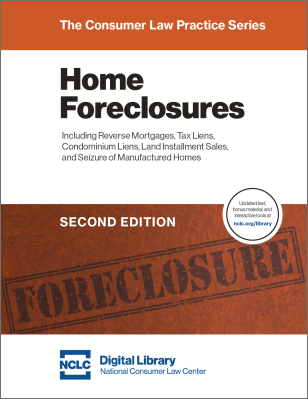With Surprising Frequency, Lenders Lose the Right to Foreclose by Waiting Too Long After Acceleration In a surprising number of cases, lenders wait so long after accelerating a mortgage obligation that they run afoul of a state statute of limitations, eliminating their right to foreclose on the home, both in judicial and non-judicial foreclosure states. In judicial foreclosure states where courts have scrutinized the lender’s authority to foreclose, lenders have put foreclosures on hold for many years, as in New York, New Jersey, and Florida. In non-judicial foreclosure states such as the District of Columbia or Hawaii, lenders faced with loss mitigation reviews as part of a mediation program similarly hold off on foreclosure for years.
Determining the Applicable Limitations Period
As described in NCLC’s Foreclosures and Mortgage Servicing § 8.2a.2, foreclosure statutes of limitations vary significantly from state to state. U.C.C. § 3-118 in virtually all states provides for a six-year limitation period for enforcement of a negotiable note and courts have found this to be the applicable deadline to initiate a foreclosure (surprisingly many home foreclosures have been put off for more than six years!). Other states have limitation periods specifically applicable to foreclosures that range from four to twenty years or even longer, or rule that the applicable limitations period is that for enforcement of a security interest in land. Id.
When Does the Limitations Period Begin to Run?
Typically, the limitations period begins to run from the date the lender accelerates the mortgage loan. In raising the limitations defense, the homeowner will have the burden of producing evidence of the date the lender demands payment of the entire loan balance. Where this notice provides a right to cure, courts are divided as to whether acceleration is triggered by the notice or the expiration of the cure period. Filing a foreclosure complaint alleging that the full amount owed is due is also clear proof of acceleration. More information on when acceleration occurs is detailed at Id. § 8.2a.3.
Actions That Revive or Toll the Limitations Period
In raising the limitations defense, homeowners must be careful of any conduct that may have revived or tolled the limitations period. This may have happened when the lender “de-accelerated” the loan by giving the homeowner clear notice that it was cancelling the acceleration, allowing the homeowner to continue paying in installments. Considering the homeowner for a modification or a trial modification or repayment agreement does not constitute de-acceleration. More on de-acceleration is found at Id. § 8.2a.4.
Does Expiration of the Statute of Limitations Clear the Homeowner’s Title?
Running of the statute of limitations can be a defense to a judicial foreclosure and can provide a basis to enjoin a non-judicial foreclosure. The next question is whether the running of that limitations period also clears the homeowner’s title so that the mortgage is no longer an encumbrance on the property.
The answer may depend on whether a state limitations period extinguishes the debt or only bars collection on the debt. On the other hand, states such as New York, Texas, and Oklahoma explicitly provide that the running of the limitations period can extinguish the mortgage, although the homeowner may need to obtain a judicial order to remove the lien. For more detail on this, see Id. § 8.2a.5.
September 2017 State Supreme Court Ruling: Prior Dismissal Prevents Foreclosure Years Later
Another surprisingly frequent lender practice is to initiate a second action to foreclose the same mortgage after a court dismissed an earlier foreclosure case with prejudice or entered judgment against the lender. On September 7, the Maine Supreme Court has just ruled in FNMA v Deschaine, 2017 WL 3908184 (Me Sept. 7, 2017), that principles of res judicata mean that the lender has forever lost the right to bring a foreclosure action after the first case was dismissed with prejudice—the mortgage obligation is discharged.
FNMA had argued that the second case involved additional delinquent payments not included in the first case. But the Maine Supreme Court found that both cases were seeking to foreclose on the full accelerated obligation, even if years later the size of the accelerated obligation was different, and that res judicata should thus apply. FNMA also argued that the homeowners would receive a windfall of a “free house,” but the court found to rule otherwise would be a windfall for the lender. The lender would be able to keep initiating foreclosure actions until it eventually prevailed in one of the cases. This decision and res judicata as a foreclosure defense are examined in more detail at NCLC’s Foreclosures and Mortgage Servicing § 8.2b.
Other Grounds to Resist a Foreclosure
NCLC’s Foreclosures and Mortgage Servicing lists other ways to defend against a foreclosure. These include:
- Does the party foreclosing have legal authority to foreclose, including whether it is the owner of the homeowner’s mortgage obligation and whether a mortgage servicer has that authority? See id. Ch. 7.
- Does a prior court ruling against the lender act as res judicata as to the foreclosure? See id. § 8.2b.
- Has the lender met procedural notice requirements, including a notice of the right to cure? Id. § 8.3.2.
- Has the lender’s conduct waived or estopped its ability to declare a default? Id. § 8.3.3.
- Does the participation of a state official allow a due process challenge? Id. § 8.3.4.
- In deed of trust states, breach of the trustee’s duty. Id. § 8.5.
- Misuse of due on sale clauses or ignoring rights of successors in interest. Id. § 8.6.
- Various equitable grounds including the lender’s good faith. Id. § 8.7.
- Failure to comply with state and local conference or mediation programs. Id. § 8.9.
- Protections for servicemembers under the Servicemembers Civil Relief Act. Id. § 8.11.
- Raising unfair lending practices as a defense. Id. Ch. 9.
- Filing bankruptcy. Id. Ch. 11.


